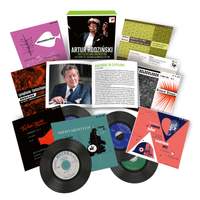Box Set Deep-Dive,
Rob Cowan on Artur Rodziński
For a start we’re offered the world premiere recording of Alban Berg’s heart-breaking Violin Concerto played by Louis Krasner, a major event, less svelte perhaps than James Ehnes or Arthur Grumiaux in the same work, but a compelling interpreter who, aided by Rodziński and his forces, focuses the work’s potent blend of theatricality, purity and ethereal flight. On the same CD, we have the Berg’s original LP coupling, another world premiere recording – conducted not by Rodziński but by another rostrum titan of the same era, Dimitri Mitropoulos [at the head of the New York Philharmonic]. Schoenberg’s Concerto this time, deemed unplayable by the eminent virtuoso Jascha Heifetz, a viewpoint handsomely disproved by Henryk Szeryng, Hilary Hahn and their like - and again, as with the Berg, Krasner’s taut reportage compensates for any perceived lack of refinement.
Another rarity is Jaromir Weinberger’s entertaining (and somewhat Regerian) Variations and Fugue on 'Under the Spreading Chestnut Tree' for piano and orchestra (soloist: Boris Goldovsky). And there’s an amazing third recording on the violin concertos disc, Mendelssohn’s E minor in a 1941 version (never before released) by Nathan Milstein. If you fancy a quick fix of great fiddle-playing, head straight for the finale; 'dazzling' isn’t the word – perhaps 'electric' would be better – even in comparison with Milstein’s four other versions of the same concerto. Just one thing I need to mention: the end of the first movement should lead directly into the second on a bassoon note, but here the first movement comes to an abrupt end leaving a gap before the andante starts. Not a major issue admittedly, but mildly irritating.
Rodziński’s principal virtue as an interpreter was a sense of colour, with an ability to translate that sense via whichever orchestra was in his charge at the time. His thrilling Cleveland account of Debussy’s La mer is a veritable tsunami, with tumultuous climaxes (and no optional fanfares in the finale) and an epic sweep to the central ‘play of the waves’. As to versatility, he could as easily turn his hand to Jerome Kern’s Showboat ‘scenario for orchestra’ with brass choirs that don a genuine showbiz vibrancy and strings that follow suit. Shostakovich is represented by a driven and impassioned Fifth Symphony – some might find it just a tad relentless – and a recording of the First Symphony that in my book is the best out there, where every changing mood is etched with a maximum of drama and pathos. He also conducts a headstrong, pacey Sibelius Fifth and a dynamic account of Finlandia.
Tchaikovsky is represented by a programme that includes a lightning-strike Romeo & Juliet Fantasy Overture (where the voltage is infinitely higher than on Rodziński's stereo remake for EMI/Warner Classics) and a version of the Fifth Symphony that ratchets up the tension for the duration. Can this dignified symphony survive the boot camp treatment? Well, it does …. just …. and the playing is terrific. As it is in Berlioz’s Symphonie fantastique, Rimsky-Korsakov’s Scheherazade and Strauss’s Ein Heldenleben (the last two feature concertmaster Joseph Fuchs as soloist). Front-of-the-stalls impact also enhances a performance of Strauss’s Till Eulenspiegel that has Strauss’s loveable ragamuffin not so much wreaking havoc as causing a full-scale riot. Fun? Not quite. But exciting? You bet!
Rodziński as Classicist turns in trim performances of Beethoven’s First Symphony and Mendelssohn’s music for A Midsummer Night’s Dream (including the Overture), the Beethoven seemingly modelled on Toscanini’s various performances, the Mendelssohn closing with what sounds like a shotgun wedding march. Why the rush? Still, like virtually everything else in this superbly transferred and well annotated set, it’ll keep you on the edge of your seat.
The Complete Columbia Album Collection
Available Format: 13 CDs




